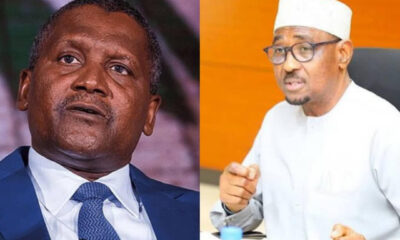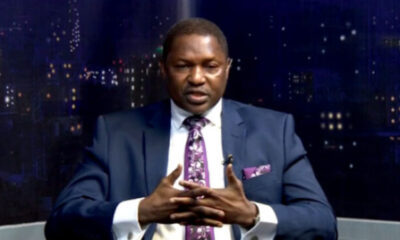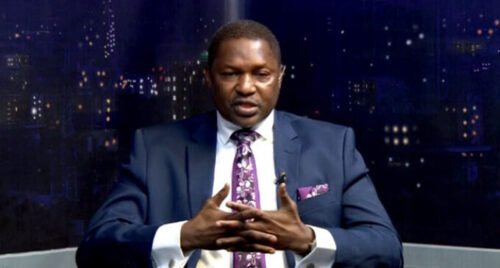When David Okorogheye of Starfield College, Fagba, Iju, Lagos was preparing for the May/June 2018 West African Senior School Certificate Examination (WASSCE) and the Unified Tertiary Matriculation Examination (UTME), there were high hopes that by October he would be in the university.
With the 2018 results of the May/June WASSCE and UTME out and his stellar performance, his classmates and school, parents as well as relations concluded he will secure automatic admission or be among the first on the merit list of the University of Lagos.
They were wrong. Despite his sterling performance in both examinations, the Delta State-born lad was denied admission on account of his age. He is 15 years old and a candidate must be 16 years before he/she can be offered admission into UNILAG and some other universities in the country.
His classmates, teachers and family members have resigned to fate that in the 2018/2019 admission exercise, David will not participate due to age barrier. In fact, he was not part of applicants that wrote UNILAG post UTME test recently.
WASSCE AND UTME RESULTS
In the May/June 2018 WASSCE, Okorogheye with examination number 4251025056 obtained 9As: Civic Education A1, English Language A1, Further Mathematics A1, Mathematics A1, Biology A1, Chemistry A1, Physics A1, Computer Studies A1 and Catering Craft Practice A1.
In the 2018 UTME he scored 332: English Language, 67, Chemistry 91, Physics 89 and Biology 85.
STAR AT SCHOOL GRADUATION
He was the star attraction at his school valedictory service/graduation as he received standing ovation several times for his academic achievements. He emerged the best student for the 2017/2018 session and was bestowed with five awards.
When the Director of Studies, Mr. Chris Eigbe informed the gathering that David lost his dad at the age of eight and his education was sponsored by his aunties and uncles, guests could not but applaud his academic feat. His Mum was close to tears.
Sounding confident of his accomplishment, Director of Studies, Starfield College, Fagba, Iju, Mr. Eigbe said every year, the school has a project tagged Director’s Project, meant to produce students with 9As in the May/June WASSCE and also ensure they score above 300 in the UTME.
He said the academic project has yielded results, stating that in 2017 WASSCE, the college produced a student with 9A1s and for 2019 it has placed five students on an academic diet to make 9As in the May/June WASSCE.
“Every year, we identify students and give them special attention and David was one of them. David belongs to the high-flying class. Students we put on the special academic diet made 8As, 7As and 6As and Bs in the 2018 WASSCE. Our plan was to make ten 9As.
“When David was in SS2, we knew he will make 9A1s and we subjected him to a high dose of studies. I have already known students that will make 9As in the May/June 2019 WASSCE. When school resumes, we shall focus on them.
“Four years ago, Amaechi made 8A1s and I told my teachers to work towards 9As. If the environment is right and with good teachers, the students will make 9As.
“My target for 2019 is 5As. I have already identified the students. To achieve the target, the focus will be on teachers’ motivation. The college does not encourage exam malpractice. The school is trying to prove to the nation that if we invest in human resources, the sky will be our limit,’’ Mr. Eigbe noted.
Eigbe also showered encomium on Teniola Faith who made 8As and B3 as well as the head girl, Oruh Abigail who obtained 7As and 2Bs. She went home with the best prefect, best in sports, lead choir singer and high academic performance awards.
The director of studies recalled that in May/June WASSCE 2011, 2012 and 2013, the college recorded 79 percent, 79 percent and 100 percent respectively.
The principal of the college, Mrs. S. Oyinloye, said it was teamwork that produced the excellent results.
AGE BARRIER AND ADMISSION
Mr. Eigbe who was not happy that David will miss out of the 2018/2019 admission exercise, pleaded that any 15-year-old secondary school graduate with an outstanding result in the May/June 2018 WASSCE and the UTME should be considered for special admission.
“That is what is obtainable in the UK, USA, Germany, Israel, France and other developed countries. Nigeria universities should not be seen as the stumbling block to youths progress. I don’t like students being delayed for years. We must tap their potentials at a young age.
“I want government, individuals, lawmakers and even corporate bodies to award a scholarship to David. Children who are brilliant should be given a scholarship. Abigail should also be bestowed with a scholarship.’’
REACTION OF STAKEHOLDERS TO David’s PLIGHT
Vice Chancellor of First Technical University, Ibadan, Prof Ayobami Salami said the National Universities Commission (NUC) did not impose age requirement for admission, but that each university through the Senate makes such policies.
Contributing to the issue, former VC of UNILAG, Prof Oye Ibidapo-Obe, noted: “There is a regulation on the minimum age for UNILAG admission. Ordinarily, there could be exceptions granted by the Senate of the university. The real issue is the ability of the student to cope with off-classroom/academic life.”
The Proprietor of Focus International School, Abeokuta, Chief Lanre Ogunjobi, pleaded with the Senate of UNILAG to grant David a waiver to enable him to take up the admission but when reminded that the school had conducted its post UTME, he felt sad describing it as a missed opportunity.
Chief Ogunjobi, however, urged the government to take interest in David’s case and monitor his progress and also appealed to Delta State governor, Ifeanyi Okowa to award the young lad a scholarship like Governor Kashima Shettima of Borno State did to Israel Zakari who made 9A1s and topped the 2018 UTME with 364.
DAVID MUM’S CONTRIBUTION
Mrs. Okorogheye described his son’s academic feat as God’s doing and lauded David’s uncles and aunties who helped fund his education after the death of his father. She said she noticed his academic prowess in primary school.
“I was happy when the school called to inform me that David made 9A1s in WASSCE. I thanked God for his performance. He was also outstanding during his primary school,” Mrs. Okorogheye pointed out.
She explained that despite his performance in WASSCE and UTME, his son cannot go to the university this academic session because of his age. The mother further revealed that she will enrol David for two years A level class.
DAVID SPEAKS ON HIS ACADEMIC FEAT
He said he studied hard and with help of his teachers and the director of studies, he made the marks in the May/June 2018 WASSCE and UTME.
On Medicine as a choice of course of study, David said the decision was informed when at eight years, he watched how doctors battled to save the life of his dad.
“I was eight years old when my father died in the hospital. I was there and I saw how the doctors and nurses tried their best. From that moment I made a vow that I will read medicine to save peoples life.
“I chose UNILAG because it was closer home and also for my mum, aunties and uncles to monitor me. I want to specialize in Neurosurgery.”
David did not betray any emotion about his missing out in the 2018/2019 admission exercise on account of age but stressed that he has taken it in good faith. He insisted that he will put in Medicine after the advanced level.
“I am a triangular student and a bookworm. My mum is a teacher and she instilled the reading habit in me. I appreciate my aunties and uncles who took over my education after the death of my dad. Abioye Okeoluwa from Osun State who made 9A1s in WASSCE motivated me,” he said.
The Director of Communications of the National Universities Commission (NUC), Ibrahim Yakassi did not pick calls but a senior staff of the regulatory body told The Education Report that it is the responsibility of each university Senate to fix age limit and other criteria for admission.
“We don’t dabble into this issue. It is the university senate that decides the age limit for admission. NUC is mainly concern with accreditation of courses, regulation of academic standard and monitoring of the universities,” she added.
Sunnews


 BIG STORY23 hours ago
BIG STORY23 hours ago
 BIG STORY18 hours ago
BIG STORY18 hours ago
 BIG STORY16 hours ago
BIG STORY16 hours ago
 BIG STORY1 day ago
BIG STORY1 day ago
 BIG STORY1 day ago
BIG STORY1 day ago
 ENTERTAINMENT21 hours ago
ENTERTAINMENT21 hours ago
 BIG STORY18 hours ago
BIG STORY18 hours ago










